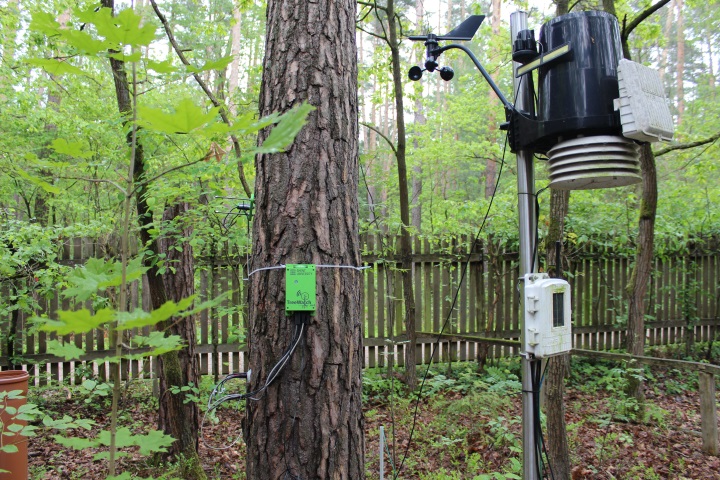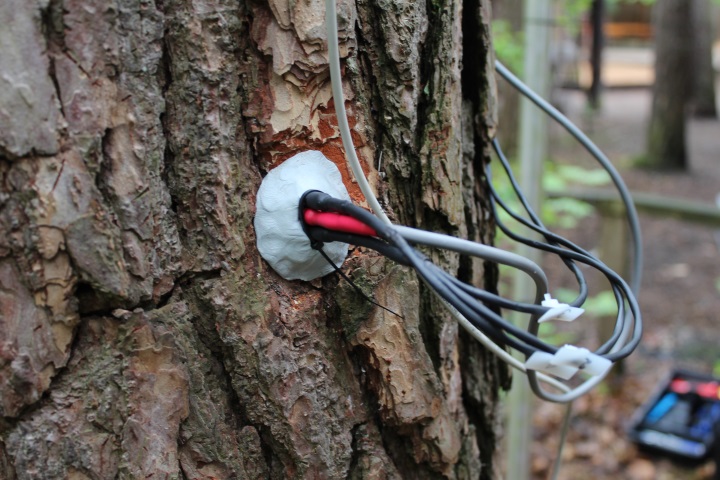Project BayTreeNet

The composite project BayTreeNet combines climate modeling, dendroecology, and educational research in a unique interdisciplinary approach. It studies the response of forest ecosystems to the current climate dynamics over the free state of Bavaria. A network of forest sites is designed in a way that the impacts of specific weather types on the growth and ecophysiology of major tree species is reflected for different growth regions. By using climate model scenarios, these tree responses will be modeled for climate conditions at the end of the 21st century. The created monitoring network will allow the quantification of forests on changes in the frequency of specific weather types and reveal potential risks for the vitality of affected forest regions. In each study region, one tree will be selected in a place accessible to the interested public and will be equipped with an internet-based transmission unit to visualize tree reactions to local climate conditions in real time. Each of these “talking trees” is looked after by a partner school that will translate the tree reactions into human spoken messages. The development of a teaching concept related to the „talking trees“ will be accompanied by research. My using this technically innovative and motivating approach, the spatially explicit effects of concrete climate events on Bavarian forest ecosystems will be illustrated to students and the public.
Subproject "Dendroecology"

The subproject works on two key aspects: Physiological, structural, biochemical and growth responses of important tree species to weather types will be analyzed for a network of five low-elevation and five high-elevation sites distributed over the area of the free state of Bavaria. These indicators of climate response will be integrated in a new model that estimates the vitality and stress level of the studied trees. Due to the disperse spatial distribution in different elevation zones, a dendroecological indicator network for Bavaria shall be established that allows a better explanation of regional growth patterns and the estimation of risk potentials during extreme weather conditions for individual forest areas under defined weather types.
The second focus is the establishment of an internet-based network of ten "talking trees" located in places of public interest close to the forest research sites. These trees are equipped with physiological instruments to monitor the reaction of the trees to climatological factors in real-time. Students from partner schools translate the response of “their” talking tree to the current weather situation in common language and thus contribute to the environmental education of the public.
Subproject "Climate dynamics"
Local climatic phenomena, such as glaciers, lakes, or vegetation patterns, always show a certain dependency on the properties of large-scale climate. On a day-to-day basis, these properties are manifested as a sequence of weather types, which enclose characteristic distributions of high- and low-pressure systems over Europe and the associated weather conditions. Subproject “Climate Dynamics” will establish the local effects of weather types for Bavaria over several decades with the help of an atmospheric (computational) model, which will be executed on high-performance systems (so-called “supercomputers”). Complementary steps will allow us to interpret the results for the recent past (e.g., 1981-2010) as well as for the expected climatic conditions in the 21st century. In particular, these steps will help to assess ecologically important elements like air temperature and precipitation in the context of extreme events. The subproject, therefore, will deliver the physical, meteorological basis for the understanding of weather type effects on selected forest sites in Bavaria. Since people usually have a strong association with weather types, which springs for instance from the daily weather reports in the media, a good connecting point to educational research on climate change impacts emerges as well.
Subproject "Education for Sustainable Development"
The focus of this research and development project is educational work on interconnections between macro weather situations and forest ecosystems in Bavaria in the context of climate change. In the course of this project, a teaching concept is designed which deals with regionally different effects of macro weather situations (which develop differently due to climate change) on forest ecosystems. The research focuses on the effects of the teaching concept, e. g. regarding changes in students’ knowledge and attitudes. The results will be the basis for a revision of the concept in order to receive an empirically founded teaching concept which has been tested in the classroom against the background of the guiding principle of Education for Sustainable Development. The teaching concept enables a knowledge transfer into the civil society using the most important institution in this context: school. Thus, a large group of future decision makers can be reached who will be especially affected by the regional consequences of climate change – a group which can also be characterized by considerable deficits especially regarding knowledge on and attitudes towards climate change (e. g. consequences of climate change or few own relations to climate change).
Tree Locations
The project BayTreeNet is centered at the Institute of Geography, University of Erlangen-Nuremberg (Germany). The location of the trees are shown on the map below. By clicking on one of the trees you are directed to the page of that particular tree on the dedicated website of BayTreeNet.
